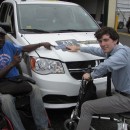- A
- A
- A

Philly Fighting for Taxis for All
 You’re stranded and alone in the fifth largest city in the country. It is 2 am, you’re 10 miles from home and there is no bus route you can take back. Most have stopped running anyway. You call for a cab for the eighth time, but there is still not a single vehicle in the whole city to that can pick you up. You have been waiting for three hours, hoping that one will come on duty. All you can do is wait.
You’re stranded and alone in the fifth largest city in the country. It is 2 am, you’re 10 miles from home and there is no bus route you can take back. Most have stopped running anyway. You call for a cab for the eighth time, but there is still not a single vehicle in the whole city to that can pick you up. You have been waiting for three hours, hoping that one will come on duty. All you can do is wait.
It’s a story common to more than 18 million people with mobility disabilities across the nation. You do everything right — you call for a ride from a taxicab company (often days beforehand, as is the current policy for many wheelchair accessible vehicles) but your ride just never shows up. And when they stand you up, you’re stuck waiting on that lonely corner.
Philadelphia has recently taken the lead in regulatory changes to prevent this situation. The Philadelphia Parking Authority’s (PPA) Proposed Rulemaking Order 126-11 would solve this problem for the City of Brotherly Love. The new regulation will require all vehicles purchased for Philadelphia taxicab service after a designated date to be wheelchair accessible. If this rule is approved, the precedent of universal accessibility will be set here in Philadelphia, and other cities across the nation will be urged to follow suit. We have waited on that lonely street corner long enough.
Philadelphia is in a unique position. The PPA, the widely revered antagonist of the successful reality TV show “Parking Wars”, has found unlikely bedfellows in Philadelphia’s disability activist community. After decades of legal dispute, the PPA has made a 180 degree PR shift away from the “Parking Wars” PPA of the past—now proposing unprecedented legislation that would make Philadelphia the first city in the country with a fully accessible, fully integrated taxicab system.
Accessibility is a civil right. Twenty-five years after the Americans with Disabilities Act was signed into law, politicians and businesses alike are still disregarding the rights of people with disabilities. As with every struggle for civil rights, a shift will only occur through the efforts of those with the strength and courage to correct injustice. We must continue the fight.
This regulation is about more than transportation. Being able to utilize a responsive transit system means being able to participate in society. It means greater exposure for our entire community, no matter the nature of your disability. Being heard and understood starts with everyone being able to come to the table. Accessibility is the first step toward creating a culture of awareness and inclusiveness, and we can’t afford to wait any longer.
Inspired by New York’s successful Taxis For All Campaign, “Taxis For All Philadelphia” is a coalition of activists focused on gathering support for the PPA’s proposal. Right now the rulemaking is up for public comment until July 13. That means the public has less than a week to show their endorsement. If accessibility is something that affects you or someone you know, speak up. You do not have to be a Philadelphia resident, just someone who cares about the civil rights of their fellow human beings. Go to Taxisforallphiladelphia.org and submit a comment. Commenters are encouraged to share a personal experience, but you can comment simply by entering your email address into our website.
Let’s make the City of Brotherly Love the first city in America with a fully accessible, fully integrated taxicab system — with liberty and taxis for all.